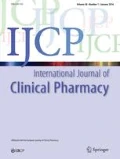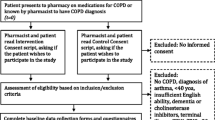Abstract
Background Chronic obstructive pulmonary disease (COPD) treatment goals are often not achieved despite the availability of many effective treatments. Furthermore, clinical pharmacist interventions to improve clinical and humanistic outcomes in COPD patients have not yet been explored and few randomized controlled trials have been reported to evaluate the impact of pharmaceutical care on health outcomes in patients with COPD. Objective The aim of the present study was to evaluate the impact of pharmaceutical care intervention, with a strong focus on self-management, on a range of clinical and humanistic outcomes in patients with COPD. Setting Outpatient COPD Clinic at the Royal Medical Services Hospital. Method In a randomised, controlled, prospective clinical trial, a total of 133 COPD patients were randomly assigned to intervention or control group. A structured education about COPD and management of its symptoms was delivered by the clinical pharmacist for patients in the intervention group. Patients were followed up at 6 months during a scheduled visit. Effectiveness of the intervention was assessed in terms of improvement in health-related quality of life, medication adherence, disease knowledge and healthcare utilization. Data collected at baseline and at the 6 month assessment was coded and entered into SPSS® software version 17 for statistical analysis. A P value of <0.05 was considered statistically significant. Main outcome measure The primary outcome measure was health-related quality of life improvement. All other data collected including healthcare utilization, COPD knowledge and medication adherence formed secondary outcome measures. Results A total of 66 patients were randomized to the intervention group and 67 patients were randomized to the control group. Although the current study failed to illustrate significant improvement in health-related quality of life parameters, the results indicated significant improvements in COPD knowledge (P < 0.001), medication adherence (P < 0.05), medication beliefs (P < 0.01) and significant reduction in hospital admission rates (P < 0.05) in intervention patients when compared with control group patients at the end of the study. Conclusion The enhanced patient outcomes as a result of the pharmaceutical care programme in the present study demonstrate the value of an enhanced clinical pharmacy service in achieving the desired health outcomes for patients with COPD.

Similar content being viewed by others
References
Pauwels RA, Buist AS, Ma P, Jenkins CR, Hurd SS. Global strategy for the diagnosis, management, and prevention of chronic obstructive pulmonary disease: national heart, lung, and blood institute and world health organization global initiative for chronic obstructive lung disease (GOLD): executive summary. Resp Care. 2001;46:798–825.
Barnes PJ. Chronic obstructive pulmonary disease: effects beyond the lungs. PLoS Med. 2010;7(3):e1000220.
American Lung Association (ALA). Chronic obstructive pulmonary disease (COPD) fact sheet. 2011 Feb. Available from: http://www.lungusa.org/lungdisease/copd/resources/facts-figures/COPD-Fact-Sheet.html.
Murray CJ, Lopez AD. Alternative projections of mortality and disability by cause 1990–2020: global burden of disease. Lancet. 1997;349(9064):1498–504.
Taskin D, Cooper CB. The role of long acting bronchodilators in the management of stable COPD. Chest. 2004;125:249–59.
GOLD. global initiative for chronic obstructive lung disease. Updated 2008. www.goldcopd.com. Accessed 10 Nov 2009.
Khdour MR, Kidney JC, Smyth BM, McElnay JC. Clinical pharmacy-led disease and medicine management programme for patients with COPD. Br J Clin Pharmacol. 2009;68(4):588–98.
Ramsey SD. Suboptimal medical therapy in COPD: exploring the causes and consequences. Chest. 2000;117:33S–7S.
Bourbeau J, Sebaldt RJ, Day A, et al. Practice patterns in the management of chronic obstructive pulmonary disease in primary practice: the CAGE study. Can Respir J. 2008;15:13–9.
Haddad LG, Al-Zyoud S, Abu Baker N, Gharaibeh H, El Shahawy O, Alramadhani R. Secondhand smoking in Jordan: clearing the air for one of the highest tobacco prevalence countries in the Middle East. Tobacco use insights. 2011; 4. doi: 10.4137/TUI.S6802. Available from http://www.la-press.com.
World Health Organization. Report on the global tobacco epidemic, 2009: the MPOWER package. Geneva, Switzerland: WHO Press; 2009.
Belbeisi A, Zindah M, Walke H, Jarrar B, Mokdad AH. Assessing risk factors for chronic disease—Jordan, 2004. MMWR Morb Mortal Wkly Rep. 2006;55:653–5.
Nsour M, Mahfoud Z, Kanaan MN, Balbeissi A. Prevalence and predictors of non-fatal myocardial infarction in Jordan. East Mediterr Health J. 2008;14:818–30.
Johnson G, Kong D, Rambha K, Stewart K. Factors associated with medication nonadherence in patients with COPD. Chest. 2005;128:3198–204.
Rutschmann OT, Janssens JP, Vermeulen B, Sarasin FP. Knowledge of guidelines for the management of COPD: a survey of primary care physicians. Respir Med. 2004;98:932–7.
Glaab T, Banik N, Rutschmann OT, Wencker M. National survey of guideline-compliant COPD management among pneumologists and primary care physicians. COPD. 2006;3:141–8.
Miravitlles M, de la Roza C, Naberan K, Lamban M, Gobartt E, Martin A. Use of spirometry and patterns of prescribing in COPD in primary care. Respir Med. 2007;101:1753–60.
National Institute for Clinical Excellence (NICE). Guideline development process information for national collaborating centres and guideline development groups. London: NICE; 2004.
Evans S, Royston P, Day S. Minim allocation by minimisation in clinical trials. 2011 Sep. Available from: http://www-users.york.ac.uk/~mb55/guide/randsery.htm.
Watson PB, Town GI, Holbrook N, Dwan C, Toop LJ, Drennan CJ. Evaluation of a self-management plan for chronic obstructive pulmonary disease. Eur Respir J. 1997;10:1267–71.
Bourbeau J, Julien M, Maltais F, Rouleau M, Beaupre A, Begin R, et al. Reduction of hospital utilization in patients with chronic obstructive pulmonary disease: a disease specific self-management intervention. Arch Intern Med. 2003;163:585–91.
McGeoch RB, Willsman K, Dowson C, Town G, Frampton C, McCartin F, et al. Self-management plans in the primary care of patients with chronic obstructive pulmonary disease. Respirology. 2006;11:611–8.
Scherer YK, Schmieder LE, Shimmel S. The effects of education alone and in combination with pulmonary rehabilitation on self-efficacy in patients with COPD. Rehabil Nurs. 1998;23:71–7.
Morisky DE, Green LW, Levine DM. Concurrent and predictive validity of a self-reported measure of medication adherence. Med Care. 1986;24(1):67–74.
Jones PW, Quirk FH, Baveystock CM, Littlejohns P. A self-complete measure of health status for chronic airflow limitation. The St. George’s Respiratory Questionnaire. Am Rev Respir Dis. 1992;145:1321–7.
Spencer S, Calverley PM, Sherwood Burge P, Jones PW, ISOLDE Study Group. Inhaled steroids in obstructive lung disease. Health status deterioration in patients with chronic obstructive pulmonary disease. Am J Respir Crit Care Med. 2001;163:122–8.
Jones PW, Quirk FH, Baveystock CM. The St. George’s respiratory questionnaire. Respir Med. 1991;85(Suppl. B):25–31.
Quanjer PH, Lebowitz MD, Gregg I, Miller MR, Pedersen OF. Peak expiratory flow: conclusions and recommendations of a Working Party of the European Respiratory Society. Eur Respir J Suppl. 1997;24:2S–8S.
El Rhazi K, Nejjari C, Benjelloun MC, Bourkadi J, Afif H, Serhier Z, Tachfouti N, Berraho M, Barberger-Gateau P. Validation of the St George’s Respiratory Questionnaire in patients with COPD or asthma in Morocco. Int J Tuberc Lung Dis. 2006;10(11):1273–8.
Lolak S, Connors GL, Sheridan MJ, Wise TN. Effects of progressive muscle relaxation training on anxiety and depression in patients enrolled in an outpatient pulmonary rehabilitation program. Psychother Psychosom. 2008;77:119–25.
Ambrosino N, Di Giorgio M, Di Paco A. Strategies to improve breathlessness and exercise tolerance in chronic obstructive pulmonary disease. Respir Med COPD Update. 2006;2:2–8.
Treasure J. Motivational interviewing. Adv Psychiatr Treat. 2004;10:331–7.
Miller W. Motivational interviewing with problem drinkers. Behav Psychother. 1983;11:147–72.
Rea H, McAuley S, Stewart A. A chronic disease management programme can reduce days in hospital for patients with chronic obstructive pulmonary disease. Intern Med J. 2004;34:608–14.
Fletcher C, Peto R. The natural history of chronic airflow obstruction. BMJ. 1977;1:1645–8.
Hill K, Mangovski-Alzamora S, Blouin M, Guyatt G, Heels-Ansdell D, Bragaglia P, et al. Disease-specific education in the primary care setting increases the knowledge of people with chronic obstructive pulmonary disease: a randomized controlled trial. Patient Educ Couns. 2010;81(1):14–8.
Hesselink AE, Penninx BW, van der Windt DA, van Duin BJ, de Vries P, Twisk JW, et al. Effectiveness of an education programme by a general practice assistant for asthma and COPD patients: results from a randomised controlled trial. Patient Educ Couns. 2004;55:121–8.
Steuten L, Vrijhoef B, Van MF. Evaluation of a regional disease management programme for patients with asthma or chronic obstructive pulmonary disease. Int J Qual Health Care. 2006;18:429–36.
Monninkhof E, van der Valk P, van der Palen J, van Herwaarden C, Partridge MR, Zielhuis G. Self-management education for patients with chronic obstructive pulmonary disease: a systematic review. Thorax. 2003;58:394–8.
Gallefoss F, Bakke PS, Rsgaard PK. Quality of life assessment after patient education in a randomized controlled study on asthma and chronic obstructive pulmonary disease. Am J Respir Crit Care Med. 1999;159:812–7.
Engstrom CP, Persson LO, Larsson S, Sullivan M. Long-term effects of a pulmonary rehabilitation programme in outpatients with chronic obstructive pulmonary disease: A randomized controlled study. Scand J Rehabil Med Suppl. 1999;31:207–13.
Ries AL, Kaplan RM, Myers R, Prewitt LM. Maintenance after pulmonary rehabilitation in chronic lung disease: a randomized trial. Am J Respir Crit Care Med. 2003;167:880–8.
Soler JJ, Martinez-Garcia MA, Roman P. Effectiveness of a specific program for patients with chronic obstructive pulmonary disease and frequent exacerbations. Arch Bronconeumol. 2006;42:501–8.
Tinkelman D, Corsello P. One year otucomes from a disaese managment program for COPD. Dis Manag Health Outcomes. 2003;11:49–59.
Bourbeau J, Julien M, Maltais F, Rouleau M, Beaupre A, Begin R, et al. Reduction of hospital utilization in patients with chronic obstructive pulmonary disease: a disease-specific self-management intervention. Arch Intern Med. 2003;163:585–91.
Casas A, Troosters T, Garcia-Aymerich J. Integrated care prevents hospitalisations for exacerbations in COPD patients. Eur Respir J. 2006;28:123–130.
Acknowledgments
The authors wish to thank Dr. Imad Aldoghim (Lieutenant Colonel Pharmacist), Department of Pharmacy, Royal Medical Services Hospital for his assistance to obtain the ethical approval for the present study.
Funding
The authors wish to express their sincere appreciation to Alzaytoonah University of Jordan for the financial support.
Conflicts of interest
None to declare.
Author information
Authors and Affiliations
Corresponding author
Rights and permissions
About this article
Cite this article
Jarab, A.S., AlQudah, S.G., Khdour, M. et al. Impact of pharmaceutical care on health outcomes in patients with COPD. Int J Clin Pharm 34, 53–62 (2012). https://doi.org/10.1007/s11096-011-9585-z
Received:
Accepted:
Published:
Issue Date:
DOI: https://doi.org/10.1007/s11096-011-9585-z




